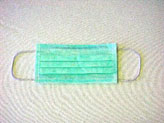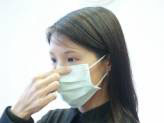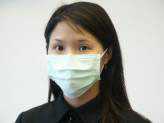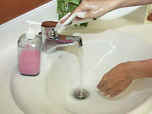General Tips
-
Wearing mask is one of the measures to prevent respiratory tract infections. Surgical mask is a type of face mask commonly use. When used properly, it can help to prevent infections transmitted by respiratory droplets.
To prevent the spread of respiratory infection, the Committee on Health Promotion and Protection recommends staff and students to wear a mask under the following circumstances:
- if they work or visit UHS and hospitals.
- if they have respiratory infection symptoms or have cared for patients with respiratory infection symptoms.
- if they work at canteen kitchens when the Serious Response Level or above is activated.
- if students have respiratory symptoms or fever and are sitting for examination within the University compound, they should wear a mask in the examination venue.
Points to note on wearing a surgical mask
-
- Perform hand hygiene before putting on a surgical mask.
- The coloured surface should be faced out and the whiter side inwards.

- Press the thin wire along the upper side of the mask against your nose bridge.

- The rubber bands should be wound around your ears, and the mask should cover part of the chin.

- The coloured surface should be faced out and the whiter side inwards.
- Do not share your mask.
- Keep the mask in a plastic or paper bag when you are not using it.
- Change to a new mask when it is soiled or damaged.
- Dispose used masks by putting them in plastic or paper bags, and then disposing them in rubbish bins with lids.
- Wash your hands afterwards.
- Perform hand hygiene before putting on a surgical mask.
-
Hand washing is an effective way to prevent the spread of diseases. Proper washing techniques is easy to learn and is highly recommended to maintain one’s good hygiene practices. Follow these 5 simple steps:
- Wet your hands with running water, (warm running water if available);

- Add liquid soap, then rub your hands to make a soapy lather. Rub your hands, between your fingers and under your nails away from the running water for at least 10 seconds. Don’t forget your wrists. The soap lather helps trap dirt and infective organisms, which can then be washed away easier.


- Rinse your hands well under the running water.

- Turn the water off with a paper towel and dispose the towel in a proper receptacle.

- Dry hands thoroughly with a disposal paper towel, or hand dryer.
- Wet your hands with running water, (warm running water if available);
Disease prevention in campus
-
In view of the latest situation and risk assessment, the CHP will enhance surveillance of suspected cases and revise the reporting criteria of Severe Respiratory Disease associated with a Novel Infectious Agent. The University Health Service will follow the revised reporting criteria and closely monitor the health surveillance on campus. The Committee on Health Promotion and Protection (CHPP) continues to monitor the latest development and take appropriate prevention and control measures according to the CHP’s recommendations.
- Cleaning is stepped up throughout the campus. School buses, toilets, public and hostel areas have already increased the frequency of daily cleanings. Frontline staff of security, school bus drivers and EMO staff will wear masks while on duty.
- Health declaration form and self-medical surveillance form (with immediate effect)
- When returning to hostel after travelling abroad, students are required to fill in the health declaration form and monitor their health status using the self-medical surveillance form for 14 days.
- When returning to work after travelling abroad, supervisor can advise staff to fill in the health declaration form and monitor their health status using the self-medical surveillance form for 14 days, if necessary.
- For medical assistance, please call our CHPP Information Co-ordinator at 3943 6436 (office hours) or email to healtheducation.uhs@cuhk.edu.hk.
- Our university has launched the medical surveillance, all cases of suspected or confirmed pneumonia cases of novel coronavirus infection should be reported to our CHPP Information Co-ordinator. The university will make appropriate arrangements accordingly.
All university members are reminded to maintain good personal and environmental hygiene to prevent pneumonia and respiratory tract infection:
- Perform hand hygiene frequently, especially before touching the mouth, nose or eyes; after touching public installations such as handrails or door knobs; or when hands are contaminated by respiratory secretions after coughing or sneezing;
- Maintain drainage pipes properly and regularly (about once a week) pour about half a liter of water into each drain outlet (U-traps) to ensure environmental hygiene;
- Wash hands with liquid soap and water, and rub for at least 20 seconds. Then rinse with water and dry with a disposable paper towel. If hand washing facilities are not available, or when hands are not visibly soiled, performing hand hygiene with 70 to 80 per cent alcohol-based handrub is an effective alternative;
- Cover your mouth and nose with tissue paper when sneezing or coughing. Dispose of soiled tissues into a lidded rubbish bin, then wash hands thoroughly; and
- When having respiratory symptoms, wear a surgical mask, refrain from work or attending class at school, avoid going to crowded places and seek medical advice promptly.
Please take heed of the health advice below when travelling outside Hong Kong:
- Avoid close contact with persons with fever or respiratory symptoms in countries/areas with possible transmission of the novel coronavirus infection. If it is unavoidable to come into contact with them, put on a surgical mask and continue to do so until 14 days after returning to Hong Kong;
- Avoid visiting hospitals. If it is necessary to visit a hospital, put on a surgical mask and observe strict personal and hand hygiene;
- Avoid touching animals (including game), poultry/birds or their droppings;
- Avoid visiting wet markets, live poultry markets or farms;
- Avoid making close contact with patients, especially those with symptoms of acute respiratory infections;
- Do not consume game meat and do not patronise food premises where game meat is served;
- Adhere to food safety and hygiene rules such as avoiding consuming raw or undercooked animal products, including milk, eggs and meat, or foods which may be contaminated by animal secretions, excretions (such as urine) or contaminated products, unless they have been properly cooked, washed or peeled;
- If feeling unwell when outside Hong Kong, especially if experiencing a fever or cough, wear a surgical mask, inform the hotel staff or tour escort and seek medical advice at once; and
- After returning to Hong Kong, consult a doctor promptly if experiencing a fever or other symptoms, take the initiative to inform the doctor of any recent travel history and any exposure to animals, and wear a surgical mask to help prevent spread of the disease.
For enquiries, please call our CHPP Information Co-ordinator at 3943 6436 (office hours) or email to healtheducation.uhs@cuhk.edu.hk.
To further understand the preventive measures of various units of the University, please refer to the Serious Response Level on CHPP website.
CHPP Preventive Recommendations: http://www.cuhk.edu.hk/health_promote_protect/preventive_recommendations.html
Centre for Health Protection, Department of Health:
- Fact sheet on Severe Respiratory Disease associated with a Novel Infectious Agent
- Information on the affected countries/areas
Latest local situation of Severe Respiratory Disease associated with a Novel Infectious Agent
-
We hope that all staff and students can observe the following precautionary measures; the University Health Service (UHS) would be happy to provide further assistance. Consult your doctor promptly if you have developed respiratory symptoms such as fever, malaise, chills, headache, joint pain, dizziness, rigors, cough, sore throat and runny nose – EARLY TREATMENT is the KEY.
Personal Hygiene
- Keep hands clean and wash hands properly with liquid soap and water. Alcohol-based handrubs are also effective when hands are not visibly soiled.
- Avoid touching eyes, nose or mouth with unwashed hands.
- Cover nose and mouth with tissues when coughing and sneezing.
- Avoid going to crowded or poorly-ventilated places. If you must do so, wear a mask and step up personal hygiene.
- Do not share towels or personal items.
- Use serving spoons and chopsticks.
- Avoid contact with poultry or birds and their droppings. If contacts have been made, wash hands thoroughly with soap and water.
- Put on a face mask when influenza symptoms or fever develop. See a doctor promptly.
Environmental Hygiene
- Maintain a clean and hygienic environment. Clean and disinfect frequently touched surfaces regularly with diluted household bleach (i.e. adding 1 part of household bleach to 99 parts of water), wait until dry and rinse with water.
- If the facilities are contaminated, wash/wipe with diluted domestic bleach (mixing 1 part of bleach with 49 parts of water) immediately.
- Maintain good indoor ventilation. Air-conditioning systems and exhaust fans should be cleaned and maintained regularly.
- Maintain proper function of toilets, drains and pipes.
Seeking Medical Assistance at UHS
- Any staff or student who has a fever or is sick should arrange an appointment at UHS. You can book in person or by phone: 39436439 or via the UHS website.
- You may contact UHS on 39436436 for further information on disease preventive measures and UHS services.
-
Student Hostel is a relatively crowded high risk area. All persons are advised to continue good hygiene habits and observe the preventive guidelines in hostels. The hostel wardens and respective hostel committees will assist in enforcing the relevant measures.
Health Declaration and Checking Body Temperature
- ALL newly admitted hostel resident students and those returning from trips outside of Hong Kong ARE REQUIRED to fill in the Health Declaration Form (online / paper) and check body temperature upon check-in to student hostels.
- Thermometers can be obtained at the front desk of student hostels for checking body temperature. Methods to take oral temperature are shown on the Powerpoint File on Taking Body Temperature.
- Any student who has a fever or is sick otherwise should seek medical attention.
Precautionary Measures
- Wash hands frequently with soap and water, especially after you cough or sneeze and before you eat.
- Cover mouth and nose when coughing and sneezing.
- Maintain good indoor ventilation.
- Keep the hostel room clean.
- Put on a face mask if you have runny nose, cough or sore throat.
- Avoid going to crowded or poorly-ventilated places.
- Do not share towels or personal items.
- Use serving spoons or chopsticks.
If fever of over 38C and/or respiratory symptoms develop:
- Wear a mask and seek medical attention promptly.
- Do not attend classes or participate in mass activities.
Stay home until recovery as far as possible.
-
Staff and students are advised to observe the following preventive measures when planning for overseas travel :
Before the trip
- Pay attention to the travel notice and health recommendations over the cities and countries that you are travelling to.
- Visit the websites of Centre for Health Protection (CHP), World Health Organization (WHO), US Centers for Disease Control and Prevention (CDC) to acquire information on disease outbreak alert at specific destinations and useful health advice.
- Postpone your trip if you have flu symptoms or fever. Wear a mask and seek medical attention.
- Bring along a pack containing adequate surgical masks, alcohol-based handrubs, alcohol-containing tissues and a thermometer to ensure a high level of personal hygiene.
- Bring with you a small quantity of common medicine (Traveller’s Pack is available at cost price at UHS).
- Visit UHS to obtain health certificates 48 hours prior to departure, if necessary.
- Check if you are adequately covered by medical insurance and the emergency contact number of the insurance company.
- Find out the emergency contact points and phone numbers at your destinations.
- Avoid all travel to areas which the HKSAR Government has issued the Black Outbound Travel Alert.
During the trip
- Maintain good personal hygiene habits, e.g. hand hygiene and cough manners, during travel.
- Comply with local public health guidelines.
- Observe food hygiene.
- Avoid contact with live poultry or animals. If contacts have been made, wash hands thoroughly with soap and water.
- Avoid crowded places and contact with fever patients.
- When symptoms of respiratory tract infection and fever develop, wear a mask and seek medical attention promptly.
Returning to Hong Kong
- Postpone your trip if you develop flu symptoms or fever.
- Closely monitor health condition after return from an affected area.
If fever and upper respiratory symptoms develop, put on a mask and seek medical attention promptly. Tell your doctor about your travel history.
